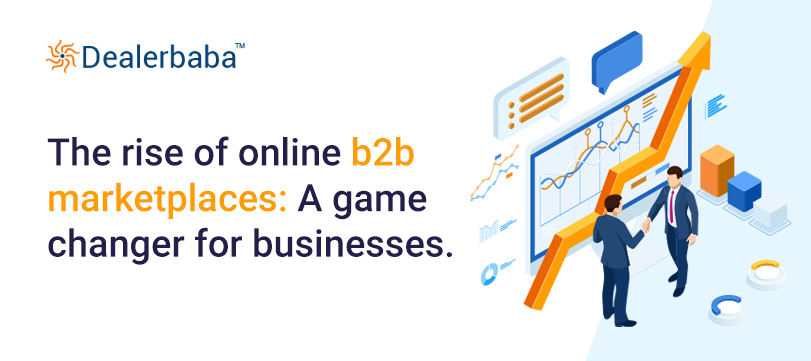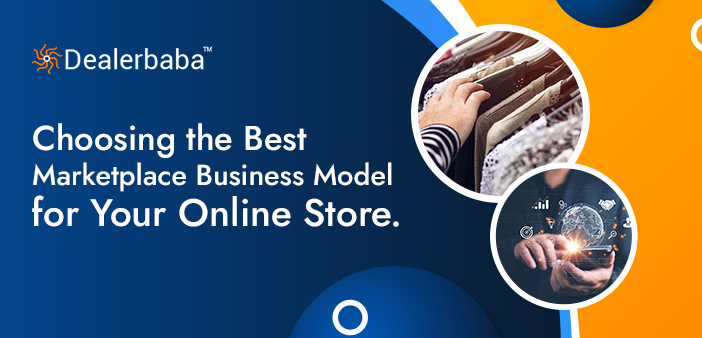-
Advertising / Agriculture / Apparel & Clothing
-
Architecture / Art & Craft / Automobiles
-
Bags & Shoes Accessories / Spare Parts / Books & Stationery
-
Business Services / Mobile Accessories / Computers & Laptops
-
Construction / Contractors & Freelancers / Education & Training
-
Electronics / Engineering / Environment
-
Event Planner / Fashion & Beauty / Financial
-
Gifts & Toys / Handicrafts / Health Care
-
Home Appliances / Hotel & Restaurants / Industrial Chemicals
-
Machinery Equipment / Information Technology / Jewelry
-
Kitchen / Instruments / Leather
-
Packaging / Personal / Plastic Products
-
Recruitment / Rental / Restaurants & Beverages
-
Security / Telecommunication / Tour & Travels
-
Transportation / Wooden Furniture
-
The rise of online b2b marketplaces: A game changer for businesses
18 Sep 2023 /
In today's fast-paced digital age, how businesses interact and transact is significantly transforming. One of the most impactful shifts is the emergence of online B2B marketplaces. The B2B online marketplaces serve as centralized hubs where companies can easily buy and sell goods or services, facilitating more efficient and streamlined operations. They embody a marketplace business model tailored to meet the unique demands and complexities of B2B transactions. Whether it's bulk procurement, specialized industrial equipment, or high-quality professional services, these platforms offer a one-stop solution for many business needs. In this blog, we'll delve into the concept of B2B online marketplaces, explore their business model, and discuss how they're altering the landscape of B2B online marketing. Read on to discover why these platforms are becoming an indispensable tool for modern businesses.
The Evolution of B2B Marketplaces
In the past, B2B transactions were primarily conducted through traditional means, relying heavily on interpersonal relationships and paper-based processes. The internet initially brought some changes to this landscape. However, the fundamental shift began with the introduction of B2B online marketplaces. These platforms introduced a new layer of transparency and efficiency, challenging the status of traditional business practices.
Modern B2B Online Marketplaces
Today's versions of these platforms are very different and much better than the old ones. Employing a marketplace business model optimized for complex B2B interactions, these digital hubs enable streamlined negotiations, deal finalizations, and even B2B online marketing. Today's online marketplace for services and products in the B2B arena has evolved into a sophisticated, data-driven ecosystem. They offer scalability and a broad array of options, making them an indispensable tool in contemporary business strategies.
What is a B2B Online Marketplace?
A B2B online marketplace is designed to facilitate the buying and selling of goods and services between businesses. Unlike traditional methods, the marketplace business model streamlines operations, making transactions quicker and more efficient.
Advantages Over Traditional Models
The essential advantage of a B2B online marketplace is its operational efficiency. It simplifies the procurement process, offering businesses a one-stop shop for various products and services. This not only saves time but also allows companies to scale with ease.
Role in B2B Online Marketing
In the context of B2B online marketing, these marketplaces serve as a potent channel for businesses to reach a broader but targeted audience. They also offer data analytics, helping companies to tailor their strategies.
Versatility and Scope
These marketplaces are not confined solely to goods; they're becoming vital online marketplaces for services, thus expanding their scope significantly.
The Marketplace Business Model in B2B
Characteristics of the Model
The marketplace business model in B2B settings revolves around connecting sellers and buyers on a single platform. It usually offers features like bulk ordering, invoicing, and tiered pricing to cater to business needs.
Revenue Streams
Most B2B online marketplaces generate revenue through commission, subscription fees, or a hybrid. This ensures sustainable growth for the market itself while offering competitive pricing for businesses.
Role in Scalability
The marketplace business model allows businesses to scale quickly, providing access to a more extensive customer base and simplifying supply chain management.
Advantages of B2B Online Marketplaces
#1. Enhanced Visibility and Credibility
B2B online marketplaces offer unprecedented visibility for businesses, allowing them to showcase their products or services to a broad and targeted audience. This elevated presence enhances the credibility of vendors, attracting more qualified buyers in the process.
#2. Streamlined Operations
One of the most compelling benefits of using a B2B online marketplace is its operational efficiency. These platforms often come with built-in invoicing, payment processing, and order management tools, eliminating the need for disparate systems and streamlining business processes.
#3. Lower Marketing Costs
Traditional marketing avenues can be expensive and less effective in reaching the intended business clientele. On the other hand, B2B online marketing within a marketplace can substantially lower acquisition costs and yield a higher ROI, thanks to targeted exposure and built-in analytics.
#4. Market Insights
B2B online marketplaces often provide analytics and customer behavior data, giving businesses critical insights into demand patterns and market trends. This invaluable information can guide inventory management and marketing strategies.
#5. Scalability
Another advantage is the scalability offered by the online marketplace for services. Businesses can quickly scale up or down based on market demand and business needs without substantially overhauling their operational structures.
B2B Online Marketing Strategies for Success
Content Marketing
In the world of B2B online marketing, content is king. High-quality, informative articles and case studies can establish your brand as an industry thought leader, attracting more B2B buyers.
Social Media
Never underestimate the power of LinkedIn, Twitter, and other platforms in B2B online marketing. Social media channels are excellent for connecting with industry leaders and promoting your marketplace business model.
SEO and PPC
Search engine optimization (SEO) is crucial for increasing organic traffic to your online marketplace for services. Pay-per-click (PPC) ads can augment this strategy, ensuring you appear in significant search results and attracting more targeted leads.
Email Marketing
Despite being one of the oldest forms of digital marketing, email remains highly effective for B2B online marketing. Personalized newsletters can nurture leads, turning potential buyers into loyal clients.
Conclusion
The emergence of B2B online marketplaces has been a game-changer for businesses worldwide. From simplifying the buying process to offering many services under one digital roof, the marketplace business model has revolutionized how businesses interact. However, success in this dynamic landscape requires a well-thought-out B2B online marketing strategy. Utilizing SEO, content marketing, social media, and PPC can elevate your platform, making it more appealing to your target audience. As we move further into the digital age, it's evident that B2B online marketplaces will continue to evolve, providing even more opportunities for businesses to grow and succeed.
Related Post
Explore Your Business Globaly By Listing On Dealerbaba
Add your business get multiple quotes
get multiple quotes
















Leave a Reply
Your email address will not be published. Required fields are marked *